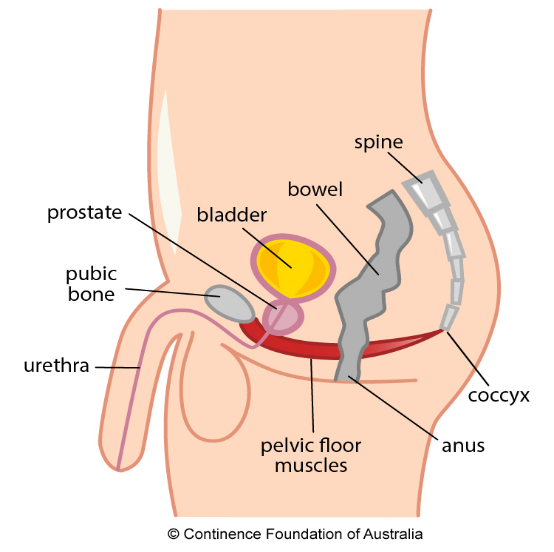Did you know? Up to 30% of men who visit their GP suffer from some form of pelvic floor dysfunction, yet 2 out of 3 men don't discuss these symptoms due to embarrassment or lack of awareness that effective treatment is available.
Understanding the Male Pelvic Floor
The male pelvic floor is remarkably similar to the female pelvic floor. It consists of a group of muscles that form a supportive sling at the base of the pelvis, stretching from the pubic bone at the front to the coccyx (tailbone) at the back.
Key Functions of Male Pelvic Floor Muscles:
- Bladder and bowel support: Maintaining continence and proper elimination
- Core stability: Working with deep abdominal muscles for spinal support
- Sexual function: Contributing to erection quality and ejaculatory control
- Pelvic organ support: Preventing prolapse and maintaining proper positioning
Why Do Men Develop Pelvic Floor Dysfunction?
Prostate-Related Issues
Clinical Evidence: Up to 40% of men experience incontinence following prostate surgery. Research shows that pre and post-operative pelvic floor physiotherapy can significantly reduce recovery time and improve outcomes.
Prostate cancer treatment, including surgery and radiation, can significantly impact pelvic floor function. Men who undergo prostatectomy often experience temporary or persistent incontinence and erectile dysfunction.
Non-Prostate Related Causes
Younger men without prostate issues can also develop pelvic floor dysfunction due to:
- Chronic stress and muscle tension
- High-impact sports and intensive training
- Chronic constipation or straining
- Previous abdominal or pelvic surgery
- Chronic coughing or heavy lifting
- Neurological conditions
Men's Pelvic Health Conditions We Treat
Pre & Post-Prostatectomy Care
Comprehensive rehabilitation programs designed to optimise recovery before and after prostate surgery, focusing on continence restoration and sexual function recovery.
Male Incontinence Treatment
Specialised treatment for stress incontinence, urge incontinence, and mixed incontinence using evidence-based pelvic floor muscle training and behavioural strategies.
Urgency & Frequency Issues
Management of overactive bladder symptoms, including sudden urges to urinate, frequent urination, and nocturia (nighttime urination).
Bowel Dysfunction
Treatment for constipation, fecal incontinence, incomplete evacuation, and other bowel-related pelvic floor disorders.
Chronic Pelvic Pain
Comprehensive management of chronic pelvic pain syndrome (CPPS), including muscle tension release, pain education, and graduated exercise programs.
Sexual Dysfunction
Treatment for erectile dysfunction and premature ejaculation when related to pelvic floor muscle dysfunction, using targeted exercises and coordination training.
Evidence-Based Treatment Approaches
Pelvic Floor Muscle Training (PFMT)
The gold standard treatment for male pelvic floor dysfunction. Our specialised physiotherapists teach proper muscle identification, strengthening, and coordination techniques tailored to each individual's needs.
Manual Therapy
Hands-on techniques to address muscle tension, trigger points, and joint restrictions that contribute to pelvic floor dysfunction. All treatments are performed with the utmost respect for patient dignity and comfort.
Biofeedback Training
Advanced technology that provides real-time feedback about muscle activity, helping patients learn proper pelvic floor muscle coordination and control.
Lifestyle and Behavioural Modifications
Comprehensive education on bladder and bowel habits, dietary modifications, fluid management, and activity modifications to support optimal pelvic health.
Why Choose Specialised Men's Pelvic Health Physiotherapy?
Research Shows: Conservative pelvic floor rehabilitation can significantly reduce the need for more invasive medical interventions, with many men experiencing substantial improvement in symptoms and quality of life.
- Specialised Expertise: Our physiotherapists have advanced training in male pelvic health
- Evidence-Based Treatment: All interventions are supported by current research
- Individualised Care: Treatment plans tailored to your specific condition and goals
- Comfortable Environment: Professional, respectful care that prioritises your dignity
- Proven Results: High success rates in symptom improvement and quality of life
What to Expect During Treatment
Your journey begins with a comprehensive assessment including a detailed health history and physical examination. We'll explain every aspect of your treatment and ensure you're comfortable throughout the process. Treatment typically involves:
- Initial comprehensive assessment and diagnosis
- Individualised treatment plan development
- Progressive exercise programs and manual therapy
- Education on self-management strategies
- Regular monitoring and plan adjustments
- Long-term maintenance and prevention strategies
Book your first appointment with Julie Blades below or call the clinic on 09 3664480.










